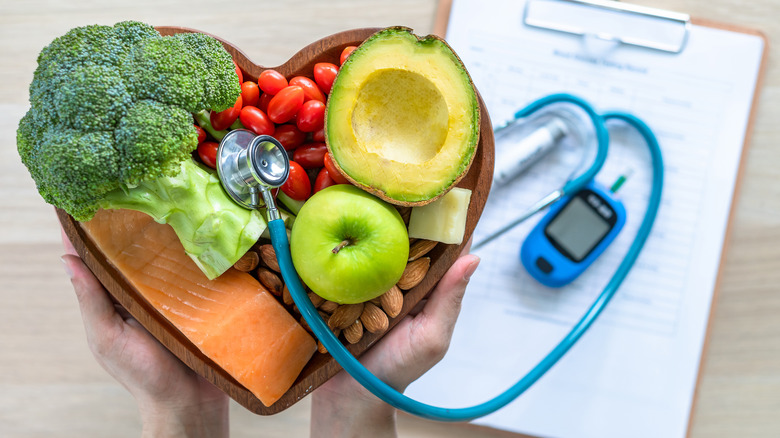Is The Keto Diet Good For Your Heart Health?
The ketogenic diet, commonly referred to as the keto diet, is a popular eating plan that emphasizes a low-carbohydrate, high-fat diet. The goal of the keto diet is to enter into a state of ketosis, which is when your body starts burning fat for energy instead of carbohydrates (via Verywell Health). While the keto diet can have a positive effect on many aspects of your health in the short term, it is probably not good for your heart in the long run.
While studies are not conclusive, many have shown that keto diets high in saturated and trans fats can lead to increased LDL (bad) cholesterol levels. This can increase your risk of heart disease and stroke (via CDC). People who do not eat many carbs may also be at a higher risk of developing atrial fibrillation, which is a type of irregular heartbeat that can lead to stroke. If you're considering the keto diet for weight loss or other health benefits, talk to your doctor first. They can help you determine if it's right for you and help you create a healthy plan that includes all the nutrients your body needs. If you do decide to try the keto diet, be sure to eat plenty of healthy fats, vegetables, and low-sugar fruits to protect your heart health in the long run.
Are there benefits to the keto diet?
The keto diet involves significantly reducing your carbohydrate intake while increasing fat intake to more than 70% of daily calories (via Healthline). This can be done by replacing carbohydrates with foods such as meat, fish, eggs, butter, oils, and nuts. So what are the potential benefits of following a keto diet? Proponents of the diet claim that it can lead to weight loss, improved mental clarity and focus, and reduced inflammation. This diet has been shown to aid in weight loss efforts and even be more effective than a low-fat diet.
Additionally, some research suggests that the keto diet may be beneficial for certain medical conditions such as epilepsy, which is what the diet was created for in the first place (via Live Science). The keto diet has also been shown to be helpful to many people with diabetes, as it can improve insulin sensitivity and help with weight loss, which can make the effects of diabetes worse.
What are the downsides to the keto diet?
While the keto diet is very popular, many health experts warn against trying it. This diet is very restrictive and can lead to many health issues. One potential issue is called ketoacidosis, which is a serious condition that can sometimes occur when people follow a very low-carbohydrate diet (via National Library of Medicine). Ketoacidosis requires emergency care. Some people who follow a keto diet may also develop kidney stones due to the high intake of animal proteins and lack of carbs (via Healthline). This can lead to high acidity levels in your blood and urine, which can then lead to high amounts of calcium in your urine. Other potential side effects of the keto diet include muscle cramps, constipation, diarrhea, and bad breath.
One of the biggest downsides to the keto diet is that it can be very difficult to stick to. This diet requires a person to be very disciplined in their food choices. There are many delicious foods out there, and it can be hard to resist eating foods that are high in carbs. This diet can also be difficult to maintain long-term, as it requires a lot of planning and preparation. The only diet that will lead to sustainable weight loss is one that you enjoy and can stick to for years to come.



